Not to be Found by Evil Spirits
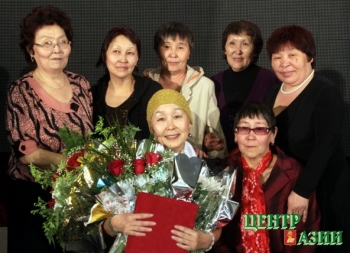 - Sainkho, if somebody addresses you as Lyudmila, will you respond? - Sainkho, if somebody addresses you as Lyudmila, will you respond?
- Certainly not. I don't react to that name anymore. And the audience won't react either. If somebody hangs up a poster: Lyudmila Namtchylak, nobody will understand anything.
- Why did you pick precisely this name as your stage pseudonym?
- A woman of that name used to live in Kyzyl - Sainkho Darzhayevna Dorzhu. She was a dancer, and later, after she retired, she worked in the Union of Theatre artists. Charming, kind, woman. I liked both her and the combination of the sounds of her rare name.
And when it became necessary to have a mysterious, exotic-sounding name which would reflect what I was doing on the stage, that is what I chose. The process of getting used to my new name began in 1986: in Krasnodar, they gave me the certificate already as Sainkho.
- The year, when Lyudmila definitively disappeared and only Sainkho remained?
- Officially in 1995.
I got the necessary documents in Kyzyl, had them verified in Moscow, then translated, took them to Vienna and submitted then at the city hall. They verified everything and entered the name Sainkho in the Austrian name registry, in the international book of names. And in 1995 they issued my passport in my new name: the artistic became official.
But for a long time there were incidents with the name. in December 2009, the head of the republic Sholban Kara-ool presented me with a document about giving me the title of "Merited artist of Republic Tyva", and it showed my previous name - Lyudmila. But this year, the document about the title "National artist of the republic" already states the name correctly.
Today, there is no more Lyudmila Okan-oolovna Namchylak. There is only Sainkho Namtchylak.
As a matter of fact, name changing is a traditional Tuvan custom. If a child is sick, or there is some other danger menacing the child, the parents would put their son or daughter with another family, with a different name, to protect the child from disaster, so that evil spirits would not find it. So in the same way I took my artistic name and put it in the passport: now they definitely won't find me.
I also advise the daughters of Tuva - the girls from the 'Tyva Kyzy" ensemble who sing khoomei, to change their names, so that the evil spirits that are supposed to be looking for them simply would not find them.
 - This advice, as I understand, concerns the complex of our female khoomei singers. Not everybody likes what the leader of "Tyva Kyzy", Choduraa Tumat, is doing. Supposedly it is not allowed for women to throat-sing - it is historically and traditionally prohibited. Choduraa is very concerned about this prohibition. In my opinion, probably too much. What do you think? - This advice, as I understand, concerns the complex of our female khoomei singers. Not everybody likes what the leader of "Tyva Kyzy", Choduraa Tumat, is doing. Supposedly it is not allowed for women to throat-sing - it is historically and traditionally prohibited. Choduraa is very concerned about this prohibition. In my opinion, probably too much. What do you think?
- I think the same way: there should be fewer inhibitions. Many things were prohibited to women - all over the world, as well as in Tuva. And they fought for their rights for a very long time - including in the arts. So, should we renounce all these rights today, because "traditionally it is not possible"?
Speaking of development and preservation of traditions, we have to remember that female version of throat-singing in Tuva has always existed, it simply was not public. Earlier, there were many more female khoomei performers than we think. Now our scientists are interested in it, and I think that they will have their say.
Today, women all over the world learn and perform Tuvan khoomei: Germans, Americans. And we ourselves should prohibit it? We have to stop this cannibalism, we have to say: yes, there was women's khoomei. And we have to keep it and develop new forms.
And it is excellent that today female khoomei continues to develop in Tuva, that the girls from "Tyva Kyzy" began to add their own attitude and understanding. Choduraa Tumat's singing is very soft, quiet, delicate, like a six-year-old boy. Ailanmaa Damyran performs closer to men's style. Each of them has her own inimitable style.
But I have this kind of an estrada variant, close to an authored song, because I already use elements of contemporary music. I change from one register to another, now I sing in a very delicate, glittering voice, then suddenly low and thrumming, and now again in the middle register.
I work in the field of sound research, invention of new forms, and I improvise a tremendous lot. I am an avant-garde singer.
Opposite Side of the Moon
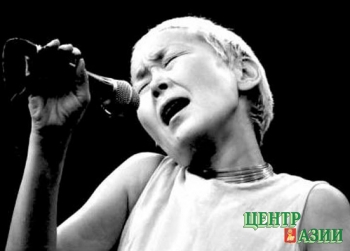 - It is not for somebody with weak nerves to be always in the avant-garde. - It is not for somebody with weak nerves to be always in the avant-garde.
- But it is like that in any kind of creative activity: somebody is the first one to start, and others follow in their footprints. And then the first one has to think of more and more again. Because that is the law: either up, or down. Others often want to take my place, even without knowing it.
- Success, just like the moon, also has an opposite side - one that is invisible to those who are admiring the Earth's satellite. Do you also know this opposite side?
- Yes, it is unavoidable: if there is esteem and love of the audiences, there will also be envy. It can't be avoided among colleagues in the same field.
I am a very sensitive person, so I feel this very acutely. I can subconsciously feel some people's attitude: so what is this - is THIS music? For some it is a cacophony, a random mess of sounds.
But for me these sounds personify the sounds of nature and of the universe, which we do not have the possibility to perceive. As monks say, out consciousness has not awakened enough to encompass and reorganize these inaudible sounds imperceptible to most, sounds of subtle worlds and distant galaxies.
Those with sarcastic attitude will rejoice: oh, but today she did not sing just like on the disc! My god, it took me six months to record the song on the disc to get it to sound precisely like that.
And then they go and try to record that song themselves in a studio, but they can't replicate it in exactly the same atmosphere and environment, and it does not work out. For one simple reason: such studios do not exist yet. And the second: what is necessary is a magical confluence of musicians, with whom the attitude of your soul is in harmony.
That is why I can't replicate everything exactly the way it is on a disc. I can only strive for a maximum approximation, because every time the musical and spiritual mood is different.
I don't want to cause them pain
- A singer, an actress without fans will wilt like a flower without rain. Who are your fans today?
- There are many fans, but that is not really personal. Most of them do not see me as a woman, only as a singer. And they deify me like a creation of nature. Their love is not really associated with me, but with my recordings.
Many young peole are among them. Many people of substance. Some are super-rich, others are poor. They are all different, but what they have in common is the love of my voice, my albums, where the voice sounds. It is already a part of their consciousness, their life.
- And is there somebody who values you as a woman - a boyfriend, as they say now?
Yes. More it is more accurate to say it this way: I love and I am loved. But I don't like to say who it is, because after my divorce with my second husband I decided not to allow anybody into my private life anymore, and not to even go to public appearances with somebody whom I love.
I would like to keep that secret. It is only mine, intimate.
Even though it slips out through the poems and songs anyway. But I don't want to cause him pain. And I don't want to cause pain to those who were with me, or want to be with me.
It is impossible to turn it off
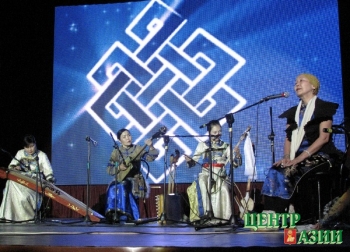 - Have you had an occasion to feel lonely in the midst of people? - Have you had an occasion to feel lonely in the midst of people?
- Very often, almost always.
But now I feel very easy with you. But I know very few peole like you - in the sense of openness. I don't know how you managed that. Such openness is expensive. I know that if I go somewhere with you, I will not feel lonely.
But even in Vienna I don't like to go to crowded places: various soirees, presentations. Certainly, that is after all the other side of success. It has even become difficult for me to go to places where they don't know who I am professionally. People feel it anyway. And it happens simply because they see my presence.
And then those streams of thoughts that they disgorge…
- I understand: to be unlike everybody else on a permanent basis - the center of attention, to astonish and make an impression is very complicated.
- By now it happens by itself, naturally. It is simply a part of me, and it is impossible to turn it off: an energy aura. And people can sense it. A sort of a phenomenon.
- Your happiest day?
- When I was given the prize in Krasnodar in 1986. And I was officially recognized.
- What is Sainkho's main deficiency?
- Smoking. Even though I try to minimize it to three cigarettes a day: morning, day and night.
- TV or radio?
- Radio.
- Book or TV?
- Book.
- Internet or paper newspaper?
- Internet. Internet is such an incredible archive. Anything can be found there.
- Your favorite dish?
- Italian pasta - spaghetti.
- Your ideal man - does someone like that exist?
- Yes, but he can't be with me. For many reasons.
- Your ideal spectator or audience - who is it?
- The one who helps me create. Who lives with your music when it is being performed.
- Your next performance in your native country - when is it going to be?
- Soon, in July. First I am going to Krasnoyarsk with a French group - to the "Sayanskoye koltso" festival, and then on to Tuva, to Chadan, to the festival of live music and faith "Ustuu-Khuree", which starts on 13 July.
There are Many Different Things in the World
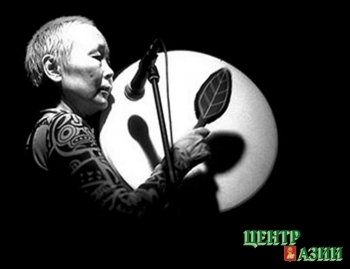 - Recognition of which country is especially dear to you? - Recognition of which country is especially dear to you?
- Naturally, my native country. But real recognition is when everybody - from children to old peole - know you, recognize you, and respect you. It is not like that so far.
It is very important for your own people, friends, close ones, and relatives started to understand you or even just to respect you.
- Were there problems with understanding?
- Yes, earlier. It was partially my fault. But the adolescent period is over. That previous adolescent in me has grown up. Now the mature period has begun.
- Is nationality important for a person?
- There is no simple answer. It depends on the situation.
The roots of one's own culture can be examined only from the national point of view, for example: I am a Tuvan, and that is that. The roots of a culture can also be examined in mutual relationships with other cultures.
You can't say that one thing is national if there is nothing that is different, something else. In the same way you can't say what a day is unless there is a night. You can't explain what is black if there is nothing white.
If I would have spent time looking only at my own people, then I certainly could not have achieved what I achieved. You can't see a face when you are face to face.
The world consists of differences. And do you know what I often think of? That one day I'll wake up in the morning, and we'll all suddenly be enlightened with the understanding of our unity. And we will learn not to quarrel, not to crush one another, but to help one another. And then we will be one step higher.
- Are you an open-minded woman?
- That also depends on the situation. In some situations I can be very conservative.
- You, and conservative? It is even difficult to imagine.
- Sometimes I can be very conservative. For example, I am for a very close relationship between generations, for what is normal in Tuva: three generations living in one house. In Europe it is almost impossible. It is certainly possible only in Eastern Europe: Slovaks, Czechs, Croatians. But Austrians and Germans - never.
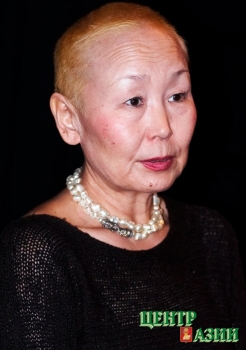 At 18 years of age, they pack your things: now you are fully independent, you live separately, and the parents can live for themselves. I can't approve of it. There is no such formality of relationships between me and my daughter like they have. At 18 years of age, they pack your things: now you are fully independent, you live separately, and the parents can live for themselves. I can't approve of it. There is no such formality of relationships between me and my daughter like they have.
- Human narrow-mindedness - is that a big minus?
- People are still a mystery to me. So that I can't say: this is real narrow-mindedness, or an artificial mask.
- The main problem of the world?
- Nuclear energy. It is possible to at least somehow control all the weapons. But nuclear energy does not depend on all those sensors. One natural cataclysm - and it is already beyond control. The tragedy in Japan last March is an example.
- The main song of your life?
- An endless song which lasts all life.
- Is there a musician or composer whose level you are trying to reach?
- The Universe. That is the best composer. Everything around us has a wave nature and it produces sounds: people, flowers, the Earth, stars, planets. The world consists of sounds.
Nature is the best composer. The rest of it comes and goes.
- And what is Sainkho's main secret?
- If it is a secret, why would I divulge it?
Photos
- After receiving "People's artist of the Republic of Tuva" and joint concert with "Tyva Kyzy". Sainkho Namtchylak with her classmates from the village of Bayan-Kol, where she had been attending classes in 1973-1974. Kyzyl, House of Peoples Creativity. April, 30 2011. Photo by Sayana Mongush.
- China, rock festival. 2006
- Italy, jazz festival. 2002.
- Sainkho Namtchylak and the group "Tyva Kyzy". Charity concert in the House of Peoples Creativity. Kyzyl. April, 30 2011. Photo by Elizabeth Gordon.
- Sainkho's endless song that lasts all life. China, 2006.
- Sainkho Namtchylak: If it is a secret, why would I divulge it?
- Sainkho Namtchylak's signature - specially for compatriots and readers of "The Center of Asia" newspaper - in paper version and the Internet.
|
